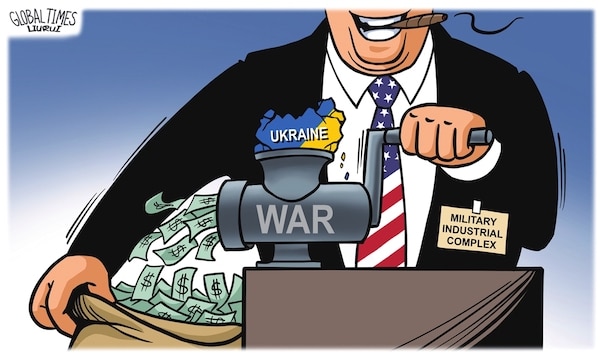After the latest round of talks between Russia and Ukraine in Turkey on Tuesday, both sides said the negotiations released positive signals. Ukraine proposed adopting neutral status in exchange for security guarantees from the international community. Russia said the country would sharply cut military activity around Kiev and Chernihiv.
But such positive signals were clearly not what the U.S. wants.
On Wednesday during White House press briefing by Communications Director Kate Bedingfield, when she was asked “Is the U.S. willing to become a guarantor of Ukraine’s security or considering that option?” Bedingfield said,
We are in constant discussion with Ukrainians about ways that we can help ensure that they are sovereign and secure. But there’s nothing specific about a security guarantee that I can speak to at this time.
Some Chinese netizens mocked that Bedingfield’s remarks was like “We won’t give any security guarantee without you falling.” It reflects that the U.S. doesn’t want to see Ukraine and Russia get along peacefully. Li Haidong, a professor from the Institute of International Relations at China Foreign Affairs University, believes the U.S. takes Ukraine as a tool to make Russia bleed, so Washington will sustain its support to Kiev. “If Ukraine and Russia reconcile, the U.S. won’t be able to make Russia bleed to the last drop of blood,” Li told the Global Times.
In addition to refraining from a security guarantee, which will lead to de-escalation of the situation, the U.S. also urged caution on the Russian pledge that it will reduce military operations. Reports said Ukrainian President Volodymyr Zelensky informed U.S. President Joe Biden on the progress of the peace talks on Wednesday in a phone call, during which Biden told Zelensky that the U.S. will send an additional $500 million in aid to Ukraine. It was also reported that Zelensky published a video address after the call, saying that Russia scaled back military operations around Kiev because Ukrainian troops’ defense has forced Russia to do so.
The conflict has bonded Ukraine tighter to the U.S., and Kiev will act more in accordance to Washington in the future. Zelensky’s video address was already a clue. If we see it from another angle, it was like: The U.S. said, “Ukraine, you need to continue the stalemate with Russia so that I can help you out,” and Ukraine answered,
OK, I’ll do something.
Li said another reason the U.S. doesn’t want to settle the Russia-Ukraine crisis soon is it wants to use the crisis to effectively control Europe and marginalize Russia while consuming more of its strength. Given the recent events led by the U.S., Washington has at least realized part of its goals. For example, the U.S. and the EU signed historic deal on gas – superficially, the deal aims to help Europe reduce dependence on Russia, but essentially it will make Europe more dependent on the U.S..
On March 24, NATO reaffirmed it “will continue to provide further political and practical support to Ukraine” and “allies are substantially increasing their defense expenditures.” By enhancing the role of NATO, the U.S. ties Europe more firmly to its chariot; and through its dominant position, the U.S. has forced Europe to take its side by escalating crisis and even war. The ultimate goal is to constantly put Europe under its control.
While pouring cold water on the Russia-Ukraine peace talks, the U.S. is stepping up its efforts to stir the conflicts. This is in line with U.S. strategic needs. If Ukraine’s appeal for a security guarantee is met, a new model of international security guarantee will be opened up, which will mean weakening the role of the U.S. and NATO. The U.S. clearly doesn’t want to see this result. It can be said that the U.S. is the biggest spoiler of the security in the entire Europe. The U.S. is the most reluctant to see a cease-fire between Russia and Ukraine.

